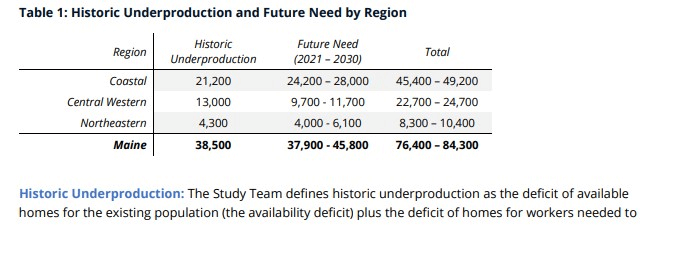The Issue:
We are very concerned that there is a trend towards “sweeping” encampments where people are temporarily living. CCSM would like to see all town/city/state officials stop these traumatic actions. All people deserve to live inside in the environment of their choice, one that is safe and supportive.
While encampments do not create a long-term housing solution, they do reflect the capacity to provide mutual support and a temporary option. Individuals in encampments should be included in creating solutions to the lack of affordable accessible housing.
Recommendations:
- Housing First: HUD’s 2023 Annual Homelessness Assessment Report (AHAR) [4] found that more than 650,000 people in America lack permanent shelters. That represents the most documented homeless individuals since the inaugural report produced in 2007 and reflects a 12 percent increase over 2022. According to the State of Maine Housing Production Needs Study, Maine needs 80,000+ housing units by 2030.
While there is a current Housing First Model that was enacted into law, 22 §20-A. This Housing First focused program will supply a great number of housing units for our most vulnerable, however; they won’t be available for an estimated 3 -4 years.[1] [2] [3] - Communities should provide encampments with basic facilities like water, trash removal, and a bathroom. [5]
- There needs to be robust services provided to all who are living outside. This should include medical services offered at encampments.
- We should have a ban on sweeps at the very least that does not allow for sweeps in the winter/cold weather unless there is citywide plan to support all individuals in need of public shelters/housing programs.
- Humanitarian Aid: There should be a one-stop shop approach to access basic human needs. Often the systems society set up are complex, difficult to access, and mired in bureaucratic red tape. We need to fundamentally make our systems easy to access and receive basic needs. There should be no wrong door to access all housing options.
- BRAP/Shelter+Care vouchers should be offered by all staff working with individuals living in encampments who qualify for them and support them in successfully using these vouchers.
- DHHS/OBH may need to ask for additional funds for the BRAP program if existing funding is exhausted.

Expected Outcome:
Fundamentally, CCSM wants to see everyone have access to stable housing. Until that day comes, we want to see everyone who is unhoused to have safe opportunities for staying at shelters or outside with the supports needed for people.
References:
[2] https://legislature.maine.gov/statutes/22/title22ch1sec0.html
